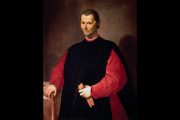
Today we celebrate the birth of James Madison, Jr., fourth president of the United States and the principal architect of the U.S. Constitution and Bill of Rights.
You can Google quotations from Madison, and you can read his contributions to The Federalist Papers online for free, so this article will tell a story rarely repeated: the story of his first campaign for office under the Constitution he helped create. As the story unfolds, readers will recognize that campaigns don’t have to be dirty and candidates do not have to sling mud at each other. Readers will see that it is possible to disagree without being disagreeable.
With the Constitution ratified by the requisite number of states, James Madison would finish his term in the soon-to-be-supplanted Continental Congress and then head back to Virginia for Christmas.
Although he assumed that he would be favored by his fellow citizens of the Old Dominion with an election to some office in the new government, Madison did not take his renown for granted, resigning himself to having to campaign in order to secure the seat in Congress he would need in order to help the new general legislature get off on the right foot.
In 1788, James Madison was disappointed not to have been elected to the first U.S. Senate (before ratification of the 17th Amendment in 1913, senators were elected by state legislatures), but he knew that opponents of the Constitution in the House of Delegates were committed to preventing him from assuming that important role.
In his autobiography, Madison refers obliquely to “particular means” used to prevent his election to the newly created United States Senate. He insists that the boundaries of the congressional districts in Virginia were drawn in such a way as to “prevent his election” to the House of Representatives, as well.
Fortunately for him (and for the Bill of Rights), his rival in the race to represent Virginia’s 5th District in the First Congress was not a political puppet, but a hero and a man of extraordinary integrity. The candidate against whom James Madison would vie for a seat in Congress was James Monroe.
Madison must have been delighted that his political foes had selected Monroe to challenge him for the House seat. Madison knew Monroe by reputation and the two had been friends for several years, after Monroe was introduced to Madison by their mutual friend, Thomas Jefferson.
In a letter to Madison written on May 8, 1784, Jefferson recommended Monroe as a man with whom Madison could confide.
“The scrupulousness of his honor will make you safe in the most confidential communications. A better man cannot be,” Jefferson informed his old friend. With such a sound assessment of Monroe’s dependability, James Madison knew he needn’t worry about being forced into an unsavory season of campaigning, despite the obstructionist efforts of his opponents.
Even with confidence in the strength of Monroe’s character, Madison likely could not have predicted how the campaign of 1788-89 would serve to build a bond between himself and James Monroe that would last the rest of Madison’s life and tie the two together as they served their country, service that would eventually lead both men to the White House.
Neither candidate looked forward to traveling around asking for votes. They recognized, however, that the political climate required them to present their positions to the people. There was no worry that there would be any animosity between the two men, however. Both were well known by their fellow Virginians as men of character who would never resort to running negative, nasty campaigns.
In his book Founding Rivals, Chris DeRose writes of Monroe’s attitude about the necessity of campaigning against James Madison, “Monroe did not have — and would never have had — anything to do with dishonest campaigning, especially against his friend.”
But, even a clean campaign requires a bit of self-promotion. In a letter written to George Washington on January 14, 1789, Madison referred to political campaigns as “pretensions,” but admitted that the situation was such in his home district that in order to be present when the new Congress convened, he would have to consent to travel (he informs Washington, with apparent incredulity, that he had “actually visited two counties”) the district and convince his countrymen that he was worthy to represent them in the House of Representatives.
Madison arrived home to Montpelier just a couple of days before Christmas, giving himself very little time to travel and meet the men who would be heading to the polls on February 2 to decide which of the two candidates would represent them when the general government got underway later that year.
In an example of disagreeing without being disagreeable, Madison and Monroe actually campaigned together! The pair appeared together in churches and courthouses around their district, speaking respectfully of each other, focusing on the issues, without a single disparaging word spoken by one about the other. In a letter to Thomas Jefferson written on March 29, 1789, Madison described the duo’s demeanor and the effect of the campaign:
Between ourselves [Madison and Monroe], I have no reason to doubt that the distinction was duly kept in mind between political and personal views, and that it has saved our friendship from the smallest diminution.
The two remained close throughout the campaign as they traveled miles in the snow, riding together in small coaches. In his biography of Madison, Ralph Ketcham describes some details of the wintry wanderings of Madison and Monroe stumping throughout the district:
On one wintery day they journeyed twelve miles to the church of a “nest of Dutchmen who generally voted together and whose vote might probably turn the scale.” According to Madison’s own account, he and Monroe sat through the service, at which two fiddles provided the music, and afterwards the two candidates kept the people standing in the snow, listening as the constitutional issues were earnestly debated. On the long ride home that night, Madison’s nose froze, leaving a scar he bore for the rest of his life.
The debate lasted for hours and the temperatures were frigid, but the audience, Madison reported, “stood it out very patiently — seemed to consider it a sort of fight of which they were required to be spectators.”
And what a spectacle it must have been!
There, huddled in a black overcoat, stood the sickly and slight Mr. Madison — coming in at about 5 feet, 4 inches tall — and standing next to him was James Monroe, a powerfully built former front-line soldier who was seven years younger and nearly a foot taller!
Scars and snow, frostbite and friendship, the 1789 campaign to be the first representative of Virginia’s 5th Congressional District was hotly contested by two men who knew how to disagree without being disagreeable. They considered it their obligation to present their views on constitutional issues, not to attack each other, demean each other, or in any way sacrifice virtue on the altar of ambition.
As the votes were tallied on February 2, 1789, James Madison won the seat handily, and never lost the respect of and for his opponent, James Monroe.




